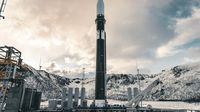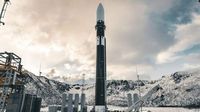Germany-based aerospace company Isar Aerospace is on the brink of making history with the launch of its Spectrum rocket, scheduled for Monday, March 24, 2025. This marks a significant milestone as it will be the first orbital rocket launch from continental Europe, taking place at the Andøya Space Center in Norway from 12:30 PM local time (7:30 AM EDT).
Founded in 2018, Isar Aerospace emerged from the Technical University of Munich, where co-founders Daniel Metzler, Josef Fleischmann, and Markus Brandl began their journey into rocketry. The trio started as student engineers developing rocket engines, and their determination has culminated in the development of the Spectrum rocket. Today, Isar Aerospace stands as one of the leaders in Europe’s burgeoning private space sector, having raised over 400 million euros (approximately $435 million) in funding, which is the most raised by any European launch startup.
Following the receipt of a launch license from the Norwegian Civil Aviation Authority on March 14, 2025, Isar prepared for this pivotal moment. The launch window opens at 12:30 PM and runs until 3:30 PM local time, a period critical for ensuring optimal conditions for launch. Isar Aerospace’s preparations included a series of qualification tests completed as late as February 2025, affirming the rocket's readiness for flight.
Spectrum is a two-stage rocket measuring 28 meters tall and designed to transport small to medium-sized satellites efficiently to various orbits. This capability poses it as a robust contender in the competitive landscape of space launches, able to carry payloads of up to 1,000 kilograms to low Earth orbit (LEO) and about 700 kilograms to a Sun-synchronous orbit. It utilizes advanced technology, including nine Turbopump-run liquid oxygen/propane-fueled engines in its first stage and a multi-ignition engine in the second stage, enhancing its operational flexibility and performance.
“While we hope to reach orbit, our primary goal during this test flight is to gather valuable in-flight data,” said a company spokesperson. “Success can be defined in many ways, and we are prepared to achieve great insights even from a brief flight.” The statement highlights a rational expectation from the launch, emphasizing data collection for the future iterations of the rocket.
The mission, dubbed “Going Full Spectrum,” is notable not just for its technical achievements but also for its symbolic gesture towards European space sovereignty. Unlike the French Guiana Space Center, the predominant spaceport for European launches, Andøya enables local launches, fostering greater control and integration within the European Union’s space aspirations.
Andøya's strategic location in Norway will support upward of 30 orbital launches annually, catering to a growing market where nations are rapidly expanding their satellite capabilities. The decision to launch from such a northern latitude also allows for unique orbital inclinations that can be advantageous for certain types of missions.
Isar has laid out ambitious plans following this initial launch attempt. With contracts already secured—including future launches for the Norwegian Space Agency’s Arctic Ocean Surveillance program—Isar is outlining pathways to a sustainable commercial launch service. They have also received orders from various clients, including a Japanese startup, ElevationSpace, which plans to send its AOBA spacecraft into orbit in 2026. This growing list of contracts underscores Isar’s attractiveness as a launch partner in an increasingly competitive space economy.
The engineering behind Spectrum reflects Isar’s innovative spirit. Constructed largely in-house, the rocket incorporates new materials and technologies, including lightweight carbon composites and 3D-printed engine components designed for high performance. The design choices intend to streamline operations and reduce costs, ensuring efficiency as the demand for satellite launches rises.
However, the path to the launch window has not been without challenges. The industry has felt pressure; Isar’s approach is keenly aware of the lessons learned from contemporaries, like Virgin Orbit, which experienced a failed launch attempt from the UK in 2023. In light of this, Isar remains focused on building a reliable system that secures payload delivery for its customers.
Isar Aerospace not only marks a significant moment for the company but also for the entire European commercial aerospace sector. As the launch gears up, anticipation grows not just for the immediate outcomes but what it may pave for future endeavors in space exploration. Analysts are now closely watching how the inaugural flight of Spectrum unfolds, hoping that its success will bolster confidence in Europe's ability to cultivate an independent, sustainable launch market.
As the countdown continues towards launch, Isar Aerospace’s commitment shines through: a mission poised to inspire a new generation of aerospace engineers and spark widespread interest in the possibilities of space, both for commercial entities and scientific exploration.
In the broader context of space exploration, Spectrum's debut will represent a transformative step forward, reinforcing Europe’s position in the global arena. If successful, it could usher in a series of developments for other European startups looking to secure their stake in what is increasingly becoming a critical facet of national and corporate strategy.
The mission is an opportunity to not only demonstrate Isar’s capabilities but also an invitation for collaboration on future innovations as the company aims to expand upon its launch capabilities and develop new technologies that could benefit the wider industry.
As the world watches, the stage is set for Isar Aerospace's Spectrum to take its first flight, a moment that could redefine the trajectory of European space capabilities for decades to come.



